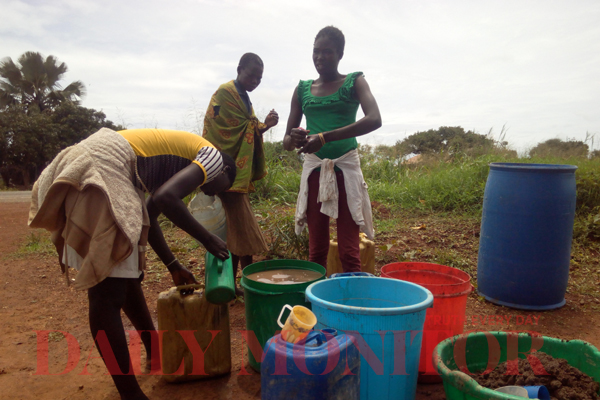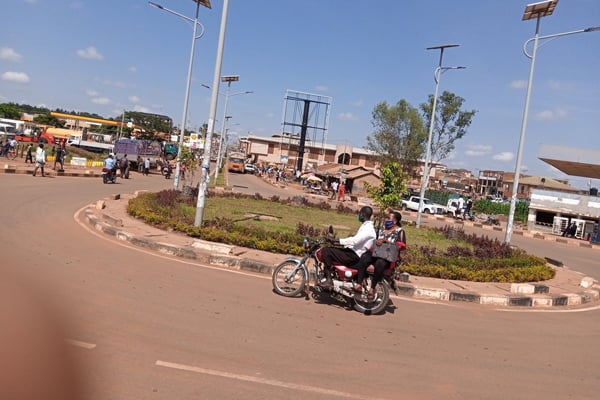Covid: Mixed fortunes as second lockdown bites

Ms Esther Akol, a resident of Napak District, prepares to sell her local brew. PHOTO/ SIMON PETER EMWAMU
What you need to know:
- Since boda boda cyclists were restricted to only ferrying goods, and cannot go beyond 5pm, some in Kamuli District are not able to make enough money to make loan payments for the bikes.
Ms Betty Lorika had been a waitress in one of the hotels in Moroto Town for eight years.
She now mines marble stones, a job she resorted to after being laid off following the outbreak of Covid-19 pandemic in the country last year.
“I tried to apply for a position at the new African Hotel in Moroto Town, I was never called. So I decided to settle for marble mining but it is not paying. One gets money only when marble brokers make payments,” Ms Lorika says.
“Life is not easy, but I have to do what it takes because if I do not work, I will be tempted to commit a crime,” she adds.
Lorika is among thousands of people across the country who have ventured into other businesses to earn a livelihood after losing their jobs following the lockdown.
Although President Museveni had lifted some of the restrictions in the first lockdown in June last year, the recent surge in Covid-19 cases and deaths forced government to declare another one for 42 days to contain the spread of the pandemic.
Restrictions
All education institutions were closed, public and private transport means banned as well as inter-district movement. Curfew was revised from 9pm to between 7pm and 5:30am, among other restrictions.
Ms Esther Akol’s dreams of going back to school vanished. The 19-year-old resident of Lorengocora Sub-county, Napak District, resorted to selling local brew after dropping out of school.
Her uncle could no longer pay for her school fees after being laid off from a factory in Kampala.
“I would be in Senior Three this year, but my guardian is unable to pay fees for me and his children. To keep myself busy, I have decided to turn to brewing local liquor,” the 19-year-old says.
Since boda boda cyclists were restricted to only ferrying goods, and cannot go beyond 5pm, some in Kamuli District are not able to make enough money to make loan payments for the bikes.
They are involved in mouse and cat chases with police as they attempt to elude arrest when found with passengers.
Residents on the Kamuli-Buyende border use the cyclists in the village paths on motorbikes to access their gardens.
“We dig in another district, so how do you expect one to remain on this side yet he has another food garden on the other side?” Albert Sodo, a resident, asks.
In Masaka City, police have intensified operations to crack down on those violating the presidential directives.
The Resident City Commissioner, Mr Fred Bamwine, says police have mounted roadblocks on all main roads leading to the city and deployment has been boosted to control movements.
“Police have inspected several streets with busy shops where traders had remained operating, but we ordered them to close and they complied. We are going to extend the operations in other parts to ensure that we do not have crowds,” he adds.
However, in Mpigi District, many business have continued to operate in disregard of the directives.
Salons, boutiques, bookshops, and Internet cafes have remained open with owners saying the President was not clear on which businesses had to close.
“Let the President explain which businesses he specifically closed. He talked about Kikuubo (commercial hub in Kampala) and business centres, which we don’t have in Mpigi,” Mr Richard Kaberenge, a salon operator in Mpigi Town, says.

A boda boda cyclist in Lira City on June 9, 2021. PHOTO/BILL OKETCH
Ms Annet Nakanyoro, a fish monger, has few clients despite remaining in business . “Some people who may need to buy fish fail because there is no public transport,” she says.
Mr Alex Muheki, Mr Samuel Atukunda and Mr Moses Bandiho abandoned their boda boda business to sell water.
Although Mr Atukunda saves Shs6,000 per day, it is more straining.
“At the end of the day, I retire home so fatigued,” he says.
Church operations have not been spared either and have instead decided to reach their flock with other means.
“We have started using radio to preach the word of God since the churches were closed by the President. People are desperate for the word, and as leaders, we have to embrace technology,” . PasPastor Samuel Byamukama of Revival Explosion Churches says, adding that they call their followers regularly to encourage them.
In Moyo District, Mr Daniel Makuma, a resident of Parego East Village in Aluru Sub-county, Arua District, normally moves to Gbala, Laropi , and other places to look for food.
Struggling
Ms Grace Ayikoru, a businesswoman in Arua City, says life is getting harder because people do not buy her goods.
“People do not have enough money to spend because they have been blocked from accessing town,” Ms Ayikoru says.
Mr Amiidu Rukundo, a taxi driver in Mbarara City, has decided to support his wife.
“My wife operates a food stall in Markhan Singh Market, Mbarara City. We have used up all the money I had in this one week of ban on inter-district public transport,” he says.
“If I don’t look for where to work and support the family, she will stop working because we are eating the capital. I found an opportunity to work as a porter where I am earning Shs10, 000 per day, This can help me feed my family,” he adds.
Mr George Mutabazi, a teacher at Mbarara Modern School, saved some money to buy a bicycle which he uses to buy fruits and vegetables. He employs boys to market the produce.
“Most of them are school-going children given to me by their parents, and I always monitor them as they carry on this business. I pay them according to their daily sales but on average it’s between Shs3,000 and Shs5,000. I can also make at least Shs10,000 daily,” Mr Mutabazi says.
Govt help in offing
Government on money announced that taxi drivers, boda boda cyclists and other groups cross the country whose businesses were affected by the lockdown will benefit from Covid cash. The beneficairies will be selected from urban centres. Government said they will mobilise the funds both locally and internationally.
By Simon Peter Emwamu, Steven Ariong, Sam Caleb Opio, Phillip Wafula, Al-Mahd Ssenkabirwa,Brian Adams Kessime, Malik Fahad Jjingo,Robert Muhereza,Felix Warom,Scovin Iceta, Alex Ashaba ,Ismeal Bategeka, Alex Tumuhimbise & Felix Ainebyoona




